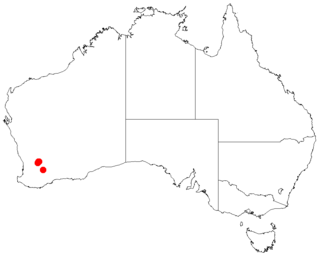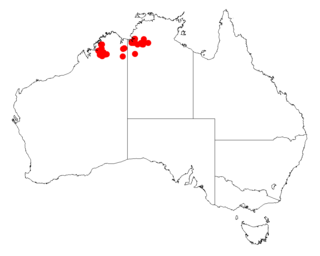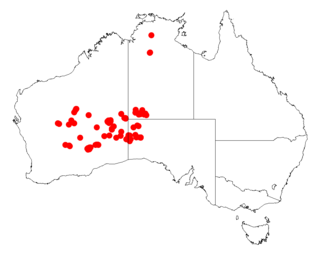
Acacia decora is a plant native to eastern Australia. Common names include the western silver wattle and the showy wattle. The species name refers to the plant's decorative qualities.

Acacia spondylophylla, commonly known as curry wattle or spine-leaf wattle, is a small, flat topped shrub native to central and western Australia. The leaves, which are arranged on spaced whorls around the stem, have a distinctive curry-like smell.

Acacia macraneura, commonly known as big mac wattle, is a shrub belonging to the genus Acacia and the subgenus Juliflorae that is native to arid parts of western Australia.

Acacia hippuroides is a shrub belonging to the genus Acacia and the subgenus Lycopodiifoliae that is endemic to north western Australia

Acacia basedowii, commonly known as Basedow's wattle, is a shrub belonging to the genus Acacia and the subgenus Phyllodineae endemic to arid parts of central Australia.

Acacia merrallii, commonly known as Merrall's wattle, is a shrub belonging to the genus Acacia and the subgenus Phyllodineae that is endemic to south western and southern Australia.
Acacia pygmaea, commonly known as the dwarf rock wattle, is a shrub of the genus Acacia and the subgenus Phyllodineae that is endemic to south western Australia.

Acacia robeorum, commonly known as Robe's wattle, is a shrub of the genus Acacia and the subgenus Phyllodineae that is endemic to north western Australia.

Acacia spinosissima is a shrub of the genus Acacia and the subgenus Phyllodineae native to south western Australia.

Acacia ancistrophylla is a shrub of the genus Acacia and the subgenus Plurinerves that is native to several areas on southern Australia.

Acacia arrecta, commonly known as Yarnda Nyirra wattle or Fortescue wattle, is a shrub of the genus Acacia and the subgenus Plurinerves that is endemic to arid areas in north western Australia.

Acacia consanguinea is a shrub of the genus Acacia and the subgenus Plurinerves that is endemism to south western Australia.

Acacia cowaniana, commonly known as Cowan's wattle, is a shrub or tree of the genus Acacia and the subgenus Plurinerves that is endemic to an area of south west Australia.

Acacia donaldsonii is a shrub of the genus Acacia and the subgenus Plurinerves that is endemism in an area of south western Australia.

Acacia froggattii is a shrub of the genus Acacia and the subgenus Plurinerves that is endemic to an area in north western Australia

Acacia helmsiana, commonly known as Helm's wattle, is a shrub of the genus Acacia and the subgenus Plurinerves that is endemic to arid areas of central and western Australia.
Acacia manipularis is a shrub of the genus Acacia and the subgenus Plurinerves that is endemic to north western Australia.

Acacia multisiliqua is a shrub or tree of the genus Acacia and the subgenus Plurinerves that is endemic to northern Australia.

Acacia obtusata, commonly known as blunt-leaf wattle or obtuse wattle, is a tree or shrub belonging to the genus Acacia and the subgenus Phyllodineae native to eastern Australia.

Acacia perangusta, commonly known as eprapah wattle, is a tree or shrub belonging to the genus Acacia and the subgenus Phyllodineae native to eastern Australia.


















